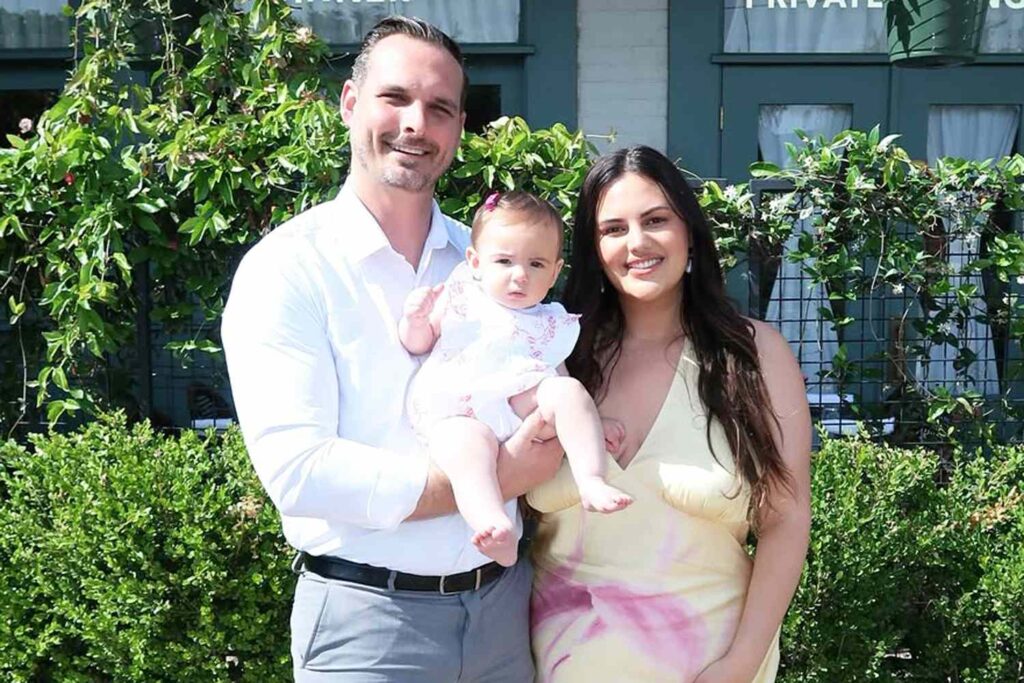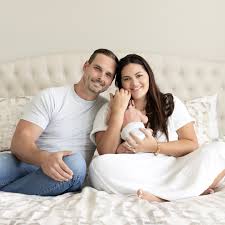Alexa Lemieux has never been one to shy away from honesty. Fans first fell in love with her when she appeared on Season 3 of Netflix’s hit show Love Is Blind, where she met her now-husband, Brennon Lemieux. The two quickly became fan favorites, known for their emotional connection and unwavering compatibility in a reality TV experiment designed to test whether love can truly be blind. But after the wedding bells faded and the cameras stopped rolling, life brought them a challenge they never expected—one that would test the strength of their relationship and Alexa’s emotional endurance: infertility.
In a candid and deeply personal conversation on the What’s the Reality? podcast, hosted by fellow Love Is Blind alum AD Smith, Alexa opened up about the emotional rollercoaster she endured on her journey to becoming a mother. Speaking through tears, she recalled the pain, the self-doubt, the physical toll, and ultimately, the joy of welcoming her daughter Vienna in July 2024. It’s a story that resonates with so many women—especially those who’ve struggled in silence—and it brings a raw humanity to a reality star often seen only through the glossy filter of fame.
“It was hard. It was really hard,” Alexa admitted during the interview, her voice cracking as she looked back on the emotional toll the journey had taken on her. She described moments of overwhelming sadness, including one particularly heartbreaking instance where she turned to Brennon and asked, “Do you regret marrying me?” It wasn’t a question rooted in their love for each other, but rather in fear—fear that she might not be able to give him the family they had both dreamed of when they first met in the pods.
Alexa and Brennon were one of the few couples from their season to not only get married but stay married after the show ended. Their love story felt real, grounded, and refreshing in a sea of reality TV breakups. But behind their strong bond was a painful journey not many fans knew about. The desire to start a family was mutual and deeply ingrained in their relationship, making each failed attempt at conception feel like a personal failure.
Like many couples facing fertility issues, Alexa and Brennon turned to medical treatments in hopes of getting pregnant. Hormone injections became a regular part of Alexa’s routine, and with them came a slew of physical and emotional side effects—weight gain, mood swings, and a sense of hopelessness that only deepened with each passing month. “Mentally, I was not doing great at all,” she confessed. “I was obviously very, very emotional, and from it, was gaining weight, so my body was off.”
As if the internal battle weren’t enough, Alexa also had to contend with the often cruel world of online commentary. Being a public figure meant that every change in her appearance was scrutinized and commented on. Strangers, unaware of the deeply personal struggle she was going through, felt entitled to point out her weight gain or speculate about her mental state. “Then I had people online pointing it out all the time, so that was really hard,” she said. It was a painful reminder of how brutal the internet can be, especially to women whose bodies are so often unfairly policed and criticized.

Eventually, the emotional and physical toll became too much to bear. Alexa and Brennon made the difficult decision to pause their fertility treatments. It wasn’t an easy choice, especially given how desperately they wanted to have a child. But it was necessary. Alexa needed to prioritize her mental health and well-being, and Brennon was by her side, supporting her every step of the way.
That decision to pause, as painful as it was, ended up being a pivotal moment in their journey. Sometimes, stepping away from the pressure and letting go—even temporarily—can open doors in unexpected ways. And that’s exactly what happened for the Lemieuxs. After taking a break from treatments, Alexa found out she was pregnant. It was a moment of disbelief, joy, and immense relief.
Her pregnancy, she shared, was healthy, smooth, and without complications. In July 2024, she gave birth to a beautiful baby girl named Vienna—a name that now carries the weight of everything it took to bring her into the world. “We’re very blessed,” Alexa said with heartfelt gratitude. “It’s not always the case, and so we were very, very lucky.”
But even now, holding her daughter in her arms, Alexa admits that the scars of the journey haven’t completely faded. “I don’t know why I’m crying, because I have a baby,” she said on the podcast. “But it was hard, and I just remember thinking that it’s never going to happen.”
That emotional honesty is what makes her story so powerful. Too often, the conversation around motherhood is sanitized—boiled down to baby showers, bump photos, and picture-perfect family portraits. What’s rarely talked about is the heartbreak that can precede it. The uncertainty. The grief. The quiet mourning of a dream that seems perpetually out of reach. Alexa’s story disrupts that narrative in the most necessary way.
Her willingness to share such an intimate part of her life is more than just an act of vulnerability—it’s a lifeline to other women and couples going through the same thing. Infertility affects millions of people worldwide, and yet the stigma around it often leaves individuals feeling isolated and ashamed. By speaking out, Alexa is helping to normalize those experiences and remind others that they’re not alone.
The story also highlights the importance of support within a relationship. Brennon’s presence, his willingness to ride the emotional waves alongside Alexa, speaks volumes about the strength of their bond. Infertility can place immense strain on a marriage, and it’s not uncommon for couples to emerge from the experience feeling distant or even fractured. But Alexa and Brennon chose to face it together, with compassion and patience. That unity, it seems, became their greatest asset.
It’s also worth noting the broader implications of Alexa’s story, particularly in a cultural moment where conversations around reproductive health are becoming increasingly urgent. Access to fertility treatments is still limited for many due to high costs, lack of insurance coverage, and societal stigma. Alexa’s story, while deeply personal, intersects with larger conversations about how we as a society view and treat women’s reproductive journeys.

For now, though, Alexa is enjoying the quiet joys of new motherhood. The late-night feedings, the tiny fingers wrapped around hers, the way Vienna’s eyes light up when she sees her parents—it’s all part of a new chapter that was hard-won. And while the road here was anything but smooth, it has made the destination all the more meaningful.
In the end, Alexa Lemieux’s story is not just one of hardship—it’s a story of hope, resilience, and the power of love in the face of adversity. It’s a reminder that behind every smiling photo is a story we may not see, and that empathy, especially toward those in the public eye, matters more than ever.
Alexa may have found love in an unconventional way on Love Is Blind, but her journey to motherhood proves that real life—the unfiltered, messy, beautiful kind—is where the real story begins.



